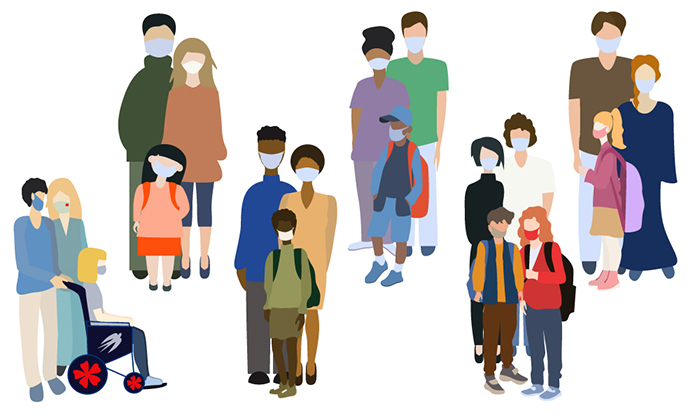Risk & Resilience: How the Pandemic Affects Those with Special Needs
Story by Becky Brown
If you’re a parent who transitioned to working from home during COVID-19, then you know it’s not easy juggling job responsibilities with the care, entertainment and education of young kids whose schools or daycares have closed. Stress levels likely went up. Productivity probably went down. Now, imagine that same experience but with a child with special needs.
Bridgette Kelleher, associate professor in the Department of Psychological Sciences and co-director of the Purdue Autism Research Center, focuses her research on children and families affected by rare genetic conditions and intellectual disabilities. It’s work she’s done for years, but the pandemic offered a new perspective on what caregivers face in their daily lives.
“COVID-19 blurred the line between work and home,” she says. “Now we’re all working from home with our kids crawling all over us, with children sitting in on our meetings. As a researcher and a parent, the pandemic has given me a new lens into the stress families we work might be experiencing.”

"Without the $10,000 from the Rapid Response Grant, we couldn’t have collected the preliminary data that allowed us to submit for this grant. HHS was really forward thinking in recognizing the need for this type of pilot project." — Bridgette Kelleher, assistant professor in the Department of Psychological Sciences
Purdue app eases data collection
Understanding how — and how much — caregivers’ lives have changed as a result of the pandemic is the focus of Kelleher’s research funded by the Rapid Response Grant program. It leverages the Purdue Early Phenotype Study, an ongoing longitudinal study she launched in 2016 to assess risk and resilience among families of children with special needs.
“This population is already under acute stress, and research shows that people with intellectual disabilities are at higher risk for COVID-19,” Kelleher says. “We wanted to explore how caregivers were coping and what additional support they might need.”
Recognizing that families were more overwhelmed than usual during the pandemic, Kelleher and her research team shifted from traditional, lengthy questionnaires to what’s known as ecological momentary assessment (EMA) to collect brief snapshots of data instead. They used an app developed by Purdue-related startup Expiwell to send “pings” to participants’ smartphones with questions several times a day.
“The goal is to make it as quick and easy as possible,” Kelleher says. “We’re seeing good response rates with the app, because we’re just asking for a minute of a caregiver’s time.”
Data comparison shows hardest hit
More than 75 families from across the U.S. are participating in the project thus far, including 50 from Kelleher’s Early Phenotype Study. That gives the research team — which includes Sean Lane, assistant professor in the Department of Psychological Sciences; Elizabeth Richards, associate professor in the School of Nursing; and Anne Wheeler, a research public health analyst with RTI International — a prior data source for comparison purposes.
“Unlike many other studies happening right now, we have the capacity to go backward in time,” Kelleher says. “We’ve been following many of these families for years, some since their children were infants, so we have data from their lives before the virus hit. That allows us to compare stress and anxiety levels before and after COVID-19.”
What they’re learning, not surprisingly, is that stress among caregivers has gone up from baseline measures. What’s more interesting is why certain caregivers are experiencing higher levels of anxiety than others.
“People who are hit the hardest are those who have seen the greatest shifts in their caregiving responsibilities,” Kelleher says. “A lot of people are used to getting respite care or their children go to school and take part in special education programs. COVID-19 took that away. These are the families we need to be keeping an eye out for.”
Pilot data makes larger grant possible
With this data in hand — along with additional pilot data gathered from projects funded by the Discovery Park Big Ideas Challenge and a grant from the Angelman Syndrome Foundation — Kelleher applied for a multimillion-dollar grant from the National Institutes of Health in August.
This larger project aims to pair additional EMA data collection with virtual therapy programs, providing support tailored to caregivers’ needs. In addition to Kelleher, Purdue team members include associate professor Dan Foti and clinical assistant professor Kelly LeMaire, both from the Department of Psychological Sciences, and professor Mandy Rispoli from the College of Education.
“Without the $10,000 from the Rapid Response Grant, we couldn’t have collected the preliminary data that allowed us to submit this grant,” Kelleher says. “Funding agencies want to see that you’re already underway — they don’t want to fund projects that are just starting. HHS was really forward thinking in recognizing the need for this type of pilot project.”
More Life 360 Stories
Milestones
Alumni
- Model Behavior
- On the Frontline of COVID-19
- Alumni making giant leaps in health care, aviation industries
- Tradition Transformed
- Emerging Leaders
Research
- Wearable and affordable, device targets swallowing disorders
- Evolution of a Research Relationship: From PhD Student to Peer
- Rapid Response Grant Recipients
Faculty
- Wearable and affordable, device targets swallowing disorders
- Beware the ‘quarantini’
- Safe and sustainable tourism in times of COVID-19
- Building a Community of Support
- Adapting Online … in a Hurry
- Thinking Beyond the Pandemic
- Rapid Response Grant Recipients
- Risk & Resilience: How the Pandemic Affects Those with Special Needs
Students
- Evolution of a Research Relationship: From PhD Student to Peer
- On the Frontline of COVID-19
- Tradition Transformed
- Adapting Online … in a Hurry
- Pandemic Pivot brings Gen Zs and Baby Boomers together in unique way
- HTM students learn and build community
- Emerging Leaders

